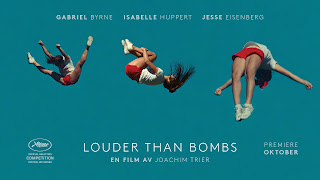They simply become my personal kind of addiction when there’s something wrong in my life, when bad or depressing thoughts burden my head and my heart.
In those moments, it is very weird the way a certain series imposes its presence on any others.
Why this one? I don’t know. It is a real mystery, it is one of those tricks you don’t understand and yet work very well.
So I don’t ask too many questions.
I'm having one of those moments, unfortunately, and so I’m eating bread and TV series (and cinema as well, of course, basically I’m going through a cinematic overdose).
Anyway, now I’m watching obsessively a TV series called Bron (The Bridge).
It is a Swedish/Danish production and back in 2011 I’ve seen the first season and really liked it. The plot is quite simple: a police woman from Malmö and a police man from Copenhagen have to work together to solve a series of killing. The reason why they’re both involved, is that the first corpse is found right in the middle of the bridge connecting the two cities, and so the ‘affair’ is to be split in two. The best thing about this series is the relationship between the two main characters: Saga Norén (played by Swedish actres Sofia Helin) from Malmö is a fortysomething woman suffering from the Asperger Syndrome, a subtle form of autism. Saga doesn’t have any kind of filter: she always says the truth, no matter what, and she has troubles with human feelings. And she is single. On the other side, Martin Rohde (played by Danish actor Kim Bodnia), from Copenhagen, is a big, cheerful even if messy man, and can’t be more different from Saga. Married multiple times, with 5 children, has a human and very often visceral approach to life and work.
The other impressive thing about this series is the atmosphere.
It is the perfect series for winter time.
Apparently, they have always filmed during bad and cold weather and also, very often, at night: there is barely some sun under the Malmö and Copenhagen skies, and people are constantly wearing heavy coats or shivering in the freezing wind.
It is also the perfect series for Scandinavian design lovers: there are some pretty amazing houses with magnificent furniture to look at.
The credits’ graphic of Bron is centred on the duality which is at the base of the entire series.
Everything is double, here. Two languages, two cities, two policemen, two ways of seeing the world, even two titles: Bron in Swedish and Broen in Danish.
To distinguish them, and also to write the two actors names on screen, they have used a simple sign, this one: I. A line that looks like a bridge.
After the first two seasons, actor Kim Bodnia (if you are familiar with Nicolas Winding Refn cinema, you should recognise this actor’s face: he was in the Pusher trilogy and also in Bleeder) decided to quit. I have no idea why.
In the third season, a new policeman from Copenhagen is sent to help Saga to solve new crimes.
In the first episode, though, this place remains vacant.
And that was the moment when I understood this series was telling me something.
I was looking at the credits of the first episode and the name of the actress Sofia Helin appeared on the screen, which was absolutely normal, then appeared the symbol of the bridge, which was normal too, and then… nothing.
I was mesmerized by this void, and by the cleverness of this idea.
From the second episode, of course, after Helin’s name appeared the one of the new actor.
Only the first episode had that absence.
I don’t know exactly why, but I keep thinking about it. I see the image: the dark tunnel, the vintage green car of Saga running through it, the name of the actress, the bridge sign and then... nothing, nothing at all.
That blank is talking to me, even if I'm not too sure about the message.
So I keep looking at Bron, hoping that void will have a name in my life too.
One day.



















.jpg)


















